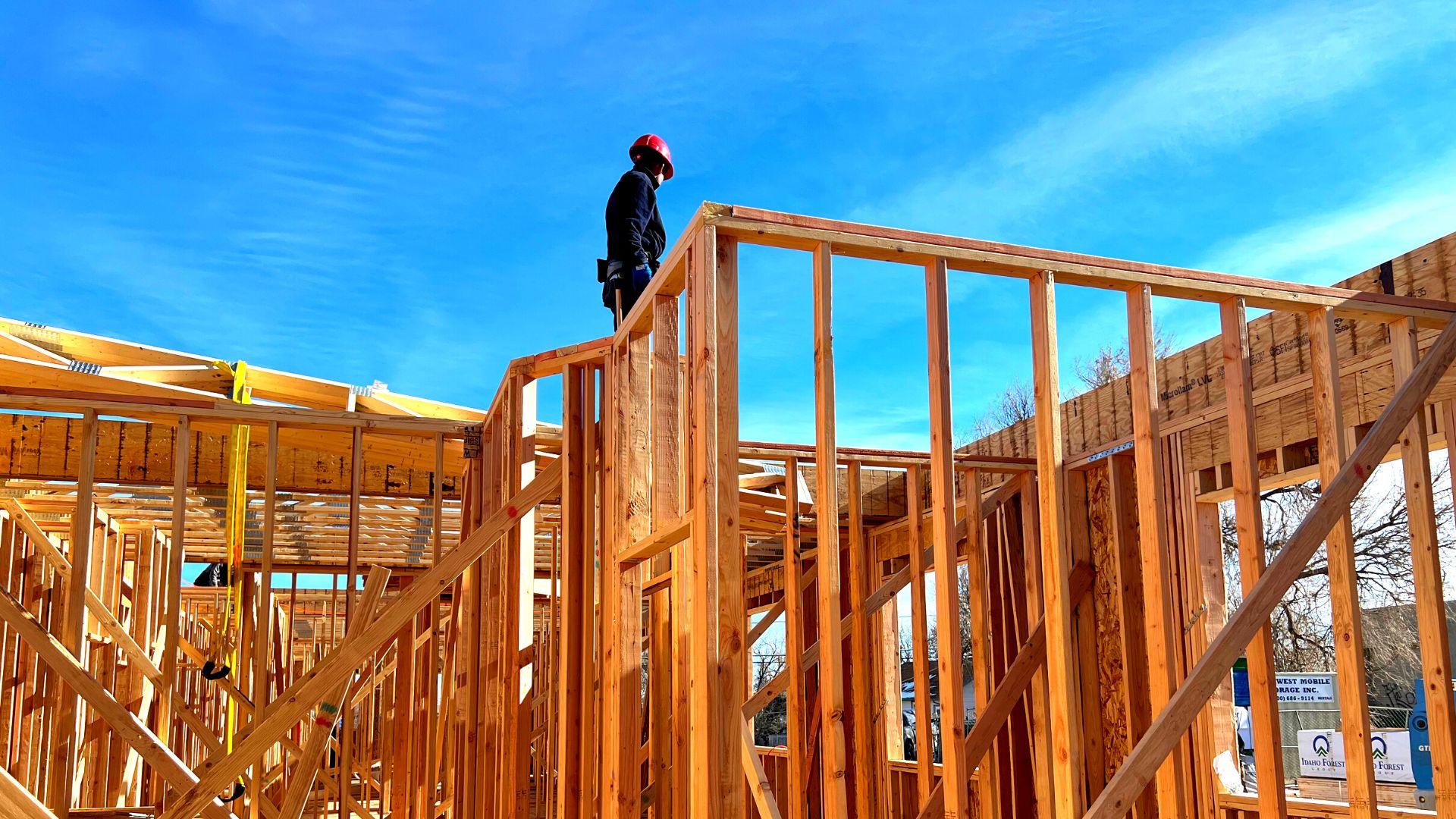Nearly a year later, Denver’s City Council has made forward progress on making it easier for property owners to build an ADU. June 5th, 2023, the Council passed an ordinance that amends the Denver Zoning Code and the Former Chapter 59 code that gives more leniency to building an ADU. While this was just beginning, Denver kept up with the overall interest residents had in building an ADU and created an ADU Advisory Committee that same year. The goal of this committee was to investigate the red tape, barriers, and common roadblocks associated with building an ADU so that a solution to the process could be found. Now, Denver’s ADU research has come to the conclusion of amending and modifying current zoning codes for all neighborhoods. This has launched the Citywide Accessory Dwelling Project or Citywide ADU Project, as part of the city’s ongoing effort to expand housing availability and choice.
Table of Contents
What is an ADU or Accessory Dwelling Unit?
What is Denver’s Citywide ADUs Project?
What changes were made to help Denver ADU Builders?
Can I Build an ADU?
Is the property zoned correctly?
ADUs need more than zoning
ADU Garage Conversions are not typical here in Denver
Denver ADU Builders Like SDB Are Here For You
What is an ADU or Accessory Dwelling Unit?
Accessory Dwelling Units (ADUs), also known as mother-in-law suites, granny flats, casitas, backyard cottages, garage apartments, or basement apartments, are self-contained living spaces that serve as extensions of existing properties. Each ADU typically includes its own kitchen, bathroom, and sleeping area. It’s important to note that despite being fully equipped living spaces, ADUs are not considered separate properties and cannot be sold independently. These units can either be “attached,” integrated within the primary residence like a basement or attic unit, or “detached,” situated in a separate accessory structure such as a backyard cottage.
Naturally, these types of projects are very intensive and require a lot of time and resources. In some sense, ADUs can be considered smaller custom home projects due to the cost, complexity, and approvals needed to complete them. Homeowners will likely need to find a licensed and experienced general contractor to lead the project. But a general contractor alone is not enough, as architectural, engineering, interior design, and numerous other trades are needed. Such a Major Residential Construction Project will benefit from companies that are familiar with these types of projects. Sustainable Design Build has successfully built ADUs in Denver and surrounding neighborhoods since interest started. Design-Build firms like SDB are perfect for being Denver ADU Builders due to their development-focused approach and single-point-of-contact project management style.
However, even with the right team of professionals on your side, the process to building an ADU is never straightforward. This is why after so many years, Denver has made progress in addressing difficulties that would otherwise stop homeowners and families from even considering an ADU project. This is great news as Denver ADU Builders are ready for changes and edits to zoning regulations by the Citywide ADUs Project.
What is Denver’s Citywide ADUs Project?
In a bid to enhance housing availability and diversity, Denver is embarking on the Citywide Accessory Dwelling Units (ADUs) project. This initiative, stemming from recommendations outlined in Blueprint Denver – the city’s comprehensive land use and transportation plan – aims to evaluate potential updates to the Denver Zoning Code, zoning map, and Former Chapter 59 zoning to permit ADUs in all residential areas across the city.
The project is a progression from the ADUs in Denver project, which focused on refining building standards for ADUs to ensure they harmonize better with various neighborhood contexts. Previously, the zoning code employed a uniform approach to ADUs with minimal consideration for neighborhood distinctions. However, with the recent code adjustments, each zone district now boasts specific design standards for ADUs, encompassing setbacks, building height, bulk plane, and other design prerequisites that must be adhered to for ADU construction.
Councilmembers Sarah Parady (at-large), Chris Hinds (District 10), and Darrell Watson (District 9) are spearheading this proposed zoning code text amendment, in collaboration with the Department of Community Planning and Development and Mayor Mike Johnston. The initiative will be complemented by a corresponding zoning code map amendment aimed at rezoning properties to align with the objectives of the text amendment. The proposal is slated to undergo City Council review and a potential vote scheduled for this summer.
By expanding the scope for ADUs throughout the city, Denver anticipates fostering greater housing inclusivity and addressing the evolving needs of its residents. The initiative not only seeks to provide more housing options but also underscores Denver’s commitment to sustainable urban development and equitable housing practices.
What changes were made to help Denver ADU Builders?
Denver’s Department of Community Planning and Development has announced the approval of zoning code changes for Accessory Dwelling Units (ADUs) by the Denver City Council on Monday, June 5. These changes, developed over a year in collaboration with a community advisory committee, technical experts, neighborhood organizations, City Council members, and the general public, are set to take effect on Wednesday, July 5. They will apply to ADU applications received after June 30.
Before these amendments, ADU design in Denver adhered to a one-size-fits-all approach, lacking differentiation based on neighborhood characteristics. The newly approved changes introduce a more nuanced approach, incorporating updates tailored to specific neighborhood contexts. Some of the key modifications include:
- Urban areas now have the flexibility to construct two-story ADUs, replacing the previous 1.5-story height limit, thereby streamlining construction processes and enhancing cost-effectiveness.
- In suburban neighborhoods, ADUs will typically be restricted to one story, with rear and side setbacks determined by neighborhood design principles.
- The exemption for building lot coverage, previously applicable to vehicle parking, is extended to ADUs, facilitating the construction of one-story ADUs, which are better suited for occupants with mobility challenges.
- Urban neighborhoods may permit dormers to extend beyond the bulk plane, enabling ADUs to better align with architectural features of the area.
- Barriers hindering the conversion of existing structures such as garages into ADUs have been eliminated, further expanding the potential for ADU development.
- Maximum floor area allowances for ADUs on smaller lots have been increased, providing the option to construct ADUs suitable for multi-generational families, thus enabling them to reside on the same property.
These zoning changes mark a significant step towards promoting housing diversity and addressing the evolving needs of Denver’s communities. By acknowledging and accommodating neighborhood variations, the city aims to foster a more inclusive and adaptable housing landscape, ensuring that Denver remains a vibrant and accessible place for all its residents.
Can I Build an ADU?
So as it was mentioned, even though zoning is the main requirement to allow construction of an ADU, being correctly zoned does not necessarily mean a property is able to build an ADU. Even if the Citywide ADU Project is voted on and approved, homes that lack the other requirements will not be able to build an ADU. Determining if you can build an ADU on your property can be nuanced, for a more descriptive set of instructions please see our page Can I Build an ADU.
Is the property zoned correctly?
Starting, by simply going to the City and County of Denver’s website to view their interactive zoning map – property owners can look up their property address for details. One piece of information that can be viewed there will be the Zoning Code associated with the property. Denver allows only specific design conformities to have ADUs built:
S-SU-F1
S-RH-2.5
S-MU-3
S-MU-5
S-MU-8
S-MU-12
S-MU-20
E-SU-B1
E-SU-D1
E-SU-G1
E-SU-D1x
E-TU-B
E-TU-C
E-RH-2.5
E-MU-2.5
U-SU-A1
U-SU-B1
U-SU-C1
U-SU-E1
U-SU-H1
U-SU-A2*
U-SU-B2*
U-SU-C2*
U-TU-B
U-TU-C
U-TU-B2
U-RH-2.5
U-RH-3A
G-RH-3
G-MU-3
G-MU-5
G-MU-8
G-MU-12
G-MU-20
G-RO-3
G-RO-5
M-RH-3
M-RX-3
M-RX-5
M-RX-5a
M-GMX
*= Some Limitations Apply
ADUs need more than zoning
Even if the correct zoning a attributed to a property or Denver’s Citywide ADU Project is approved, that does not mean an ADU can be built. Denver Homeowners should be warned that even if their homes meet all the criteria for zoning codes to allow ADU construction, there may be other factors that can bar them from actually pursuing the project. Some items that can withhold a project can be:
- Encroaching setbacks (a home is too close to the property line to allow additional construction).
- Neighborhood design requirements.
- The overall cost of a project, ADU construction projects can range from $450k – $700k minimally.
ADU Garage Conversions are not typical here in Denver
As Denver homeowners embrace the latest trend in Accessory Dwelling Units (ADUs), many are eager to kickstart their own projects. One potential avenue gaining traction is the conversion of old garages into ADUs. However, the feasibility of such conversions is hindered by several factors:
Age and Structural Integrity
Denver’s older homes often feature detached garages that lack the structural requirements necessary to support an ADU. These garages may be under-engineered, making them unsuitable for conversion without significant renovation work.
Foundation Requirements
Most detached garages in Denver are constructed on concrete slabs, which may not meet the foundation standards necessary for habitation, as required by ADU regulations.
Property Line and Setback Issues
Existing garages may infringe upon property lines or setback regulations, making them ineligible for conversion into ADUs without violating building codes and zoning ordinances.
These challenges highlight the complexities involved in repurposing garages into ADUs and underscore the importance of careful planning and compliance with local regulations for homeowners considering such projects in Denver.
Denver ADU Builders Like SDB Are Here For You
Navigating the complexities of ADU construction requires expertise and experience. Companies like Sustainable Design Build (SDB) have successfully undertaken ADU projects in Denver and surrounding areas. With a development-focused approach and single-point-of-contact project management style, SDB is well-equipped to assist homeowners in realizing their ADU vision amidst evolving zoning regulations and construction challenges.
Connect With Us
Planning your next renovation, or maybe you are looking to do a complete remodel for your home? Whatever the task, it can’t hurt to ask. Reach out to our team through this form.
We can schedule a free consultation and discuss everything you need to get your project moving in the right direction. Did we mention, it’s absolutely free?



Recent Comments